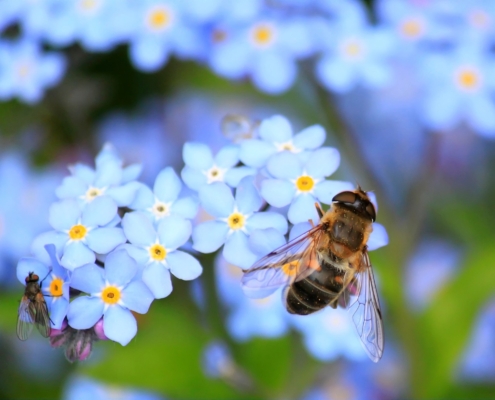We know that the honey bees population on a global scale is on a big decline. But luckily for Canada, this has not been the case. Western Canadian populations are growing at all-time high. According to Bees Matter the population of bee colonies grew from roughly 450,000 to close to 600,000.
Although these numbers look promising, we should be conscious about our choices in life that impact the bees.
Below are some tips on how to create a bee friendly environment in your yard.

- Don’t buy plants with Pesticides – NeonicotinoidsThere are many big box stores that spray their plants with Neonicotinoids, this pesticide is a neurotoxin to bees and can be deadly. This cause alone is the biggest reason as why bees are dying off. Many big stores such as Home Depot, Walmart, and Lowes sprays their plants with this pesticide. When shopping for plants, it is best to inquire if this is the case.
- Find plant nurseries that use ecofriendly ways to treat their plantsSome nurseries around the area use bee friendly ways to treat their plants that are environmentally friendly and safe for bees. Consult with your local horticulture specialist to inquire about how the plants are treated. At Sherwood Nurseries we ensure that our plants are bee friendly to keep them safe.
- Got a bug problem? Use environmentally friendly ways to treat themThere are many different methods available to you should you need to get rid of pests. Below are some things you can use.
Depending on what type of infestation you have will help you determine how to get rid of the pests. Typically, the ways you can treat your plants that won’t hurt bees are:
– Neem Oil
Is nontoxic to birds, mammals and bees. When a pest eats a plant treated by Neem oil, they usually will die but not likely affect pollinators since they are not eating the plant itself.– Plant herbs
Using certain herbs such as dill, mint, basil, lemongrass and more repels certain insects. Identify the insect first to determine what you should plant to ward them off.– Vinegar
This could be used to kill weeds and does not harm bees, however if you use this on your plants it way kill them so it is best to use as a weed killer or getting rid of ant hill for example. - Save your DandelionsIt may seem like Dandelions are a pest to us and spread all over our lawn but it is best to resist the temptation to kill this weed, especially when spring has begun. Dandelions are an important resource for honey bees until other flowers have bloomed.
- Have a bee swarm in your area?It can be frightening to see a large cluster of bees in unlikely places but be aware that bees are very vulnerable at this time. This usually happens towards the end of summer as the bees leave their hive and are traveling about protecting their queen.

If you see a swarm please call a local bee keeper and they will safely remove them for the benefit of you and the bees.


